|
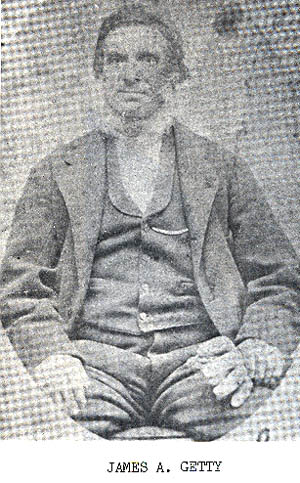 James A. Getty,
Sr was born to
John and Elizabeth "Eliza" Getty on June 19,
1810. I am not certain of his birthplace, but
presume it was Craigs, although it could have
been at his father's home in Ballynafie. It
isn't certain as to what type of schooling was
available in Ireland at that time, but it has
been plain to see by James' writings that he was
an educated man. James A. Getty,
Sr was born to
John and Elizabeth "Eliza" Getty on June 19,
1810. I am not certain of his birthplace, but
presume it was Craigs, although it could have
been at his father's home in Ballynafie. It
isn't certain as to what type of schooling was
available in Ireland at that time, but it has
been plain to see by James' writings that he was
an educated man.
On June 17, 1831, James
married Matilda M. McCaughey. Matilda was born
July 2, 1813. Her father was Hugh McCaughey, a
prosperous farmer and landowner in the Townland
of Limnahary, Parish of Ahoghill. James and
Mattie settled in the Parish of Craigs, in the Townland of Dreen, popularly called The Granagh
(meaning "the rock"), an ancient name for part
of Craigs.
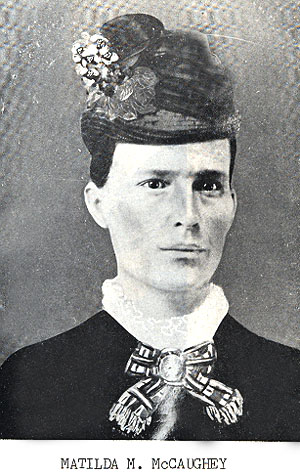
Seven children were born to
them in Ireland:
-
William John, May 14, 1832;
-
Nancy Ann, January 2, 1835;
-
James, Jr., November
24, 1837;
-
George Kilpatrick, September 21, 1840;
-
Eliza Jane, October 26, 1843;
-
Alexander C., February 16, 1846;
-
Hugh McCaughey, October 6, 1849.
They had two more children in the
United States:
-
Peter McGinley, August 18, 1853;
-
Charles H., August 22, 1856
The earliest record we have
of the James Getty family, other than baptisms,
is the 1851 Census for Ahoghill Parish. Although
they were living in the Townland of Dreen, for
some reason part of Craigs Parish was included
on the Ahoghill Census. This record shows James
to be a linen weaver.
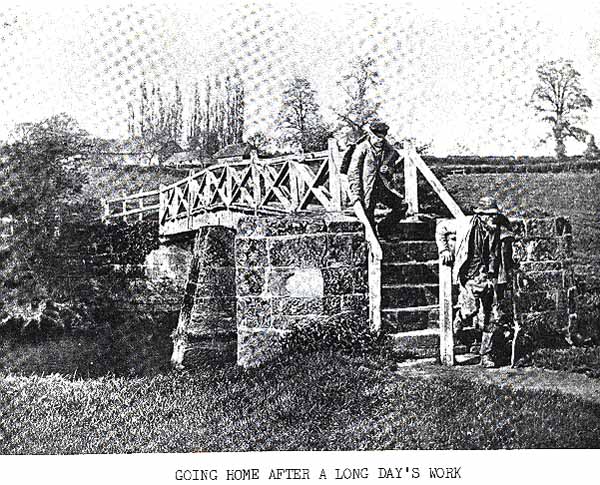
After reading further, you
will note that James was apparently a tenant
farmer, as well as a linen weaver in the linen
mills.
On June 15, 1851, James
wrote the following letter to Matilda from the
Belfast Jail.
 |
|
My Dear Matilda
I received a letter this
day at 2 o'clock and it informed me that you had
offered Campbell the key but you had not the
place cleared as you let me to know that Jenny
McMullen and Sarah McGugan will leave it on
Monday. I must now let you know, and I think I
did so before now, that he could not be obliged
to give a letter of release till all is removed.
Had it not been for putting poor Jenny to still
greater and perhaps webs in the loom, I would
have given up at the time before the
commissioner. But I certainly thought and still
does think I cannot be held longer than the
place is rid and possession given up. I can let
Campbell know that he is under the rules of
Court as well as I am, and although he is now
come off victorious, his victory can only be
attributed to his false swearing and bribing
O’Rourke. I wish you to pay attention to what I
say do go and when the Granagh is rid, again
offer him the key in presence of a witness and
if he refuses to give a letter of release to the
governor of the Jail, you must get an affidavit
by witness that you have done so, and send it to
the governor enclosed in a letter. If you had
showed my letter to William Stred or some
intelligent person, I would have been home
before this time.
I send you enclosed a few
lines that you may show Campbell, as he talks of
me sending you a letter to authorize you to give
up the Granagh and all appurtenances, houses and
tools. I am only obligated by commissioner to
give possession of two houses, for they swore
they had possession of the land. Campbell first
swore he had got possession of it himself, and
then he swore it was Phillips got it for him.
However, remove all as I directed you and have
me as soon as possible on the way home, for I do
much apprehend that you are poorly off in
getting through. I have thought more long since
the commission than I did in all eight weeks
previous to that.
I am much concerned about
the trouble and expense you have been put to,
but you must persevere to the end according to
my instructions. I trust my friend Reilly will
get through his trouble. I never heard a more
noble hearted fellow. In writing to me he says
his small sum will never cost him a thought. I
sometimes write a few verses when I am idle in
order to amuse myself and I here send you a few
addressed to yourself hoping to be soon home and
to find you all in good health. I subscribe
myself your affectionate husband.
James Getty
Belfast Jail June 15th 1851
|
|
 |
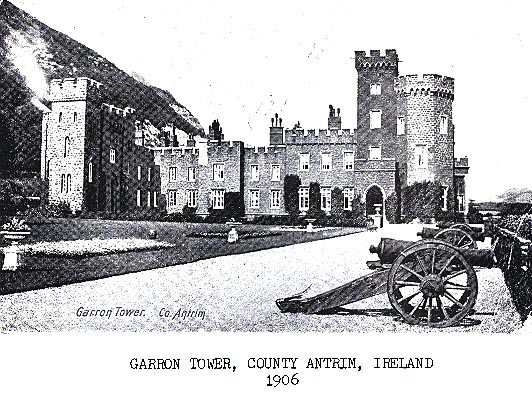
As previously mentioned,
James Getty and three of his children, as well
as his younger brother, John, worked in the
linen mill. In addition, he was a tenant farmer
of an area which they spoke of as the "Granagh".
It appears that there were at least two houses
in the "Granagh" which he sublet. During this
era the British government was seizing lands,
and James was about to be evicted from the
"Granagh". He was arrested and put in jail until
he agreed to release his holdings to a Mr.
Campbell, the new tenant who had been chosen by
the crown.
A careful search by the
Irish Genealogical Association was made of the
Belfast Newsletter of 1851. Detailed accounts of
all court hearings were given but no mention of
James Getty was found. A & D O’Rourke were found
to be solicitors (attorneys) in Ballymena.
They, no doubt were the O’Rourke mentioned in
James' letter. The association came to the
following conclusion: "Apparently James Getty's
case was not a criminal one, and was heard in a
minor court. After the famine years of 1845 and
1847, many tenants fell behind with their rent
and were either evicted by their land lord or
had their belongings seized as payment, or both.
From the letter it seems that James Getty had
two subtenants, Jenny McMullen and Sarah
McGugan. Obviously James felt he had a case
against eviction and was trying to make an
appeal against the court decision. Campbell was
apparently to be the new tenant." No doubt James
lost his case.
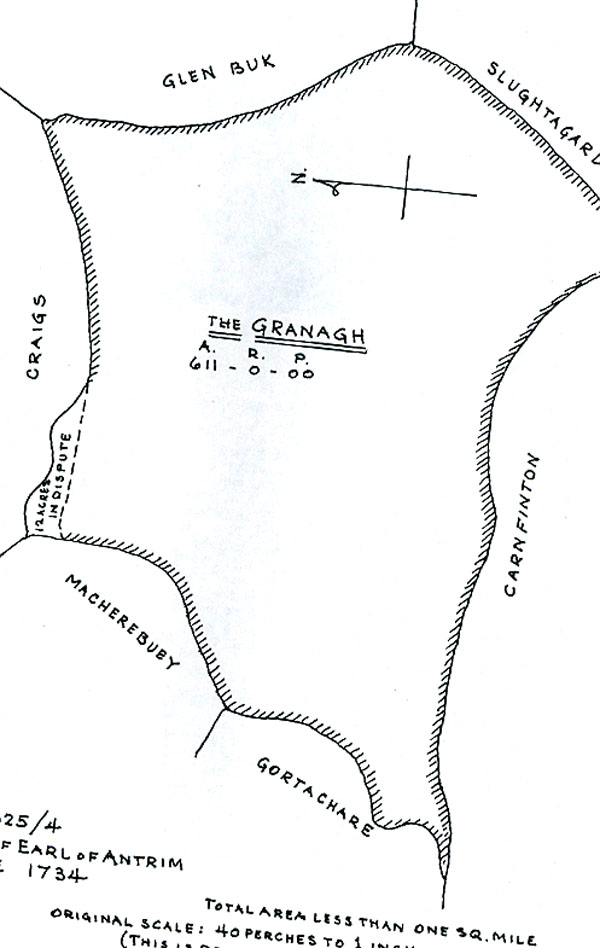
What actually transpired
after James was released from jail is not known,
but there seemed to be an apparent urgency for
him to leave the country. He did not wait to get
his affairs in order, but sailed on the first
boat available to America. His oldest son,
William, had already left Ireland in 1848 and,
with glowing accounts of the riches to be made
in America, he had been urging his father to
pull up stakes and come here to start a new
life.
Where Mattie and the
children stayed for the next year isn't known.
mother, Eliza, had died in 1848, but his father,
John, was still living. had brothers and sisters
in the Cullybackey area, and Matilda's parents,
McCaugheys, were at Limnahary.
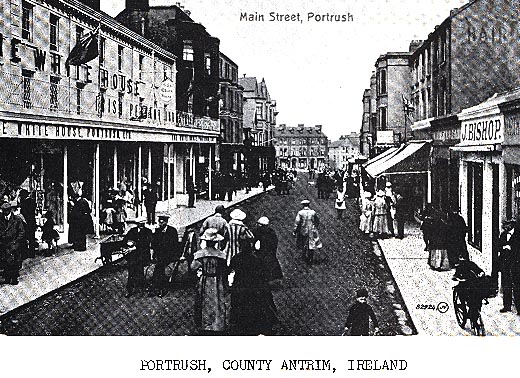
As soon as James arrived in
New York, he made his way to Groveland, where a
friend, Peter McGinley, had a small farm just
outside of town. A year later he sent for his
wife and children. William offered to go back to
Ireland in order to escort the family to
America. It was almost unthinkable for a woman
with children to sail that long distance
without a man, so William, who had a beard and
looked older than his years, gave his age as 20
and posed as Matilda's husband.
They sailed on the William
Rathbone, with I. W. Spencer as the master. It
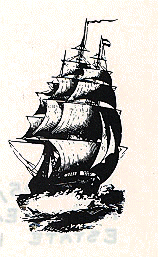 took approximately four weeks to make the long
journey across the Atlantic. They endured a
great deal of discomfort because there were only
three cabins and they were forced to ride in
steerage where the accommodations were inferior,
to say the least. The icy winds of autumn rocked
the boat unceasingly, but nevertheless they
finally arrived at the Port of New York on
October 2, 1852. took approximately four weeks to make the long
journey across the Atlantic. They endured a
great deal of discomfort because there were only
three cabins and they were forced to ride in
steerage where the accommodations were inferior,
to say the least. The icy winds of autumn rocked
the boat unceasingly, but nevertheless they
finally arrived at the Port of New York on
October 2, 1852.
They remained at Groveland
for two more years, and while they were living
there, on August 18, 1853, their eighth child
was born, Peter McGinley Getty, named for their
friend and benefactor.
While at Groveland, James
received a letter from a Joseph Anderson who
lived at South River, Ontario. Joseph was
probably a brother to William Anderson, who was
James' brother-in-law. Joseph urged James to
come to Ontario where land was cheap. This
letter is on the following page. The Gettys had
several friends and neighbors who had already
emigrated to America and had purchased farms in
the northeastern part of Ridgeway Township,
Lenawee County, Michigan. This was a factor
when making the final decision as to where to
settle.
In late 1854 the family
traveled by way of boat on Lake Erie to Toledo,
then by horse and wagon to Ridgeway Township.
James bought his first land
in America on November 9, 1854 a forty acre
parcel in Section 36, Lenawee County. A typed
copy of this deed appears on Page 40.
 |
|
South River 4 March 1854
Dear James Getty
It gives me much pleasure
to acknowledge the receipt of your letter of the
23 ULT to hear that you have been favored with
good health since you came to this country, and
that your wife and family have arrived to you
safe and in good health, while many of our
countrymen have been doomed to a watery grave.
When you view your
circumstances and journings you will see ample
grounds to say that goodness and mercy have
hitherto followed you, and that your cup of
blessings runneth over. I hope Mrs. Getty likes
this country and although we all esteem the old
country as the place which gave us birth, the
very name of it will be ever dear to us, yet
looking at all circumstances we have reason to
be thankful that we are in America. I am glad to
hear of your success and prosperity in a
pecuniary point of view. I hope you will be
equally zealous with regard to spiritual things
which alone can make you rich indeed. Please say
to Mrs. Getty from me, Mrs. A. and family, that
we would be truly glad to see you and her and
family in Canada. Land I think is more easily
purchased here than in the States. When I came
first to this neighborhood I bought 100 acres of
land at 4t dollars per acre also I bought 100
more long side of my first hundred at ten
shillings per acre all pretty good land; but
land is advancing fast in price here for I have
200 acres last year in addition to what I had
and it cost me 2000 dollars; there were about 80
acres cleared upon it. We keep ten or twelve
cows and eight or nine horses.
I think I could buy land
for you here at from 5 to ten dollars per acre.
Come and see this country
and if you like it as I think you will we will
soon get you a farm. You would think yourself
almost in the Granagh were you here. Robert
Slick and family, Thomas Gilman and family who
used to weave for Bob Speer, John Workman's
family, Sam Hinting's two sons, John and James
Johnston of the Craigs and Robert Millian with
many others from our neighborhood are all here.
I was sorry to hear of your
father's death. It just reminds me of our
savior’s admonition to his disciples be ye
therefore also ready. Who of the family now live
in the Granagh and are they all married. Mr.
Johnston and family are well. He lives at Norval
JO miles west of Toronto. We had a visit from
his second son last fall. James his oldest son
is thinking of going home to Glenhugh again in
the spring. Mr. Johnston has accumulated a great
deal of wealth.
Our family consists of the
Mrs., myself, five sons and one daughter. They
are all at home but one. My third boy is in a
home in the town of Kimptville.
The price of labor is
higher with you than with us. A servant boy will
get from ten to 14 dollars per month, but as the
consequence of 4 railroads in conjunction with
us, I expect the price of labor will advance
this summer. Mrs. Anderson and family all join
with me in sending our best wishes to you, Mrs.
Getty, and family. Please write often, James.
Dear James with great respect.
Joseph Anderson
To
Mr. James Getty Groveland, N. Y
|
|
 |
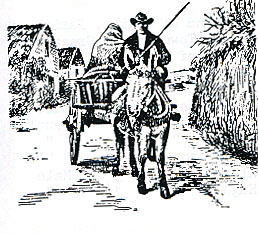
 |
|
Warranty Deed
THIS INDENTURE made the
ninth day of November in the year of Our Lord
one thousand Eight hundred and fifty four
between Peter C Vandeventer and Mariah his wife
of the Township of Ridgeway in the County of
Lenawee & State of Michigan of the first part
and James Getty of the Township of Groveland &
County of Livingston and State of New York of
the second part witnesseth that the said party
of the first part in consideration of the sum of
Four hundred dollars to them duly paid the
receipt whereof is hereby acknowledged has sold
and by these presents does grant and convey to
the said party of the second part his heirs and
assigns from all that tract or parcel of land
situate in Twp of Macon, County of Lenawee,
State of Michigan, S.E.1/2 of N.W.1/2 of Section #J6
in Twp. #5 South of Range 5 East containing 40
acres by the same more or less
Peter C. Vandeventer To James Getty
A true copy recorded
December 2nd 1854 at 2 O’clock PM
H Eddy Deputy Register
Witnesses Isaac Kniffen
Sanford House, Justice of
the Peace November 9, 1854
Signed
Peter C Vandeventer
|
|
Note: James' home, when he
bought the above property, is Groveland, New
York. These forty acres was directly behind the
forty acres which we call the "homestead". It
wasn't until ten years later, in 1864, that
James bought the forty acres which did become
his homestead, according to the date on the
deed. However, it is believed that James'
family 'lived on the homestead much earlier than
1864. |
|
 |
As mentioned before, there
were several Irish families who had already
settled in the area where James and his family
bought their farm. They often got together to
help one another as well as for social events.
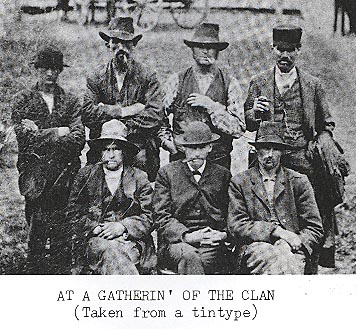
James Getty may not have
had any personal encounters with Indians,
because, even though the Pottawatamies habitat
was Soothe Michigan, they rarely put in an
appearance in Lenawee County, especially as
late as the 1850's.
However, arrowheads, stone
tools and other artifacts were found which
proved that at an earlier date they had camped
in various places in Ridgeway and Macon
Townships.
The first settlers saw the
Indians quite frequently, but even in the early
1800's, the Pottawattamie had no permanent
villages in Eastern Lenawee County. The big
swamp harbored disease, and was infested with
mosquitoes and snakes, but since all kinds of
wild game were plentiful, they made occasional
hunting trips to this area. These trips were
usually made in dry weather when the swamp was
dried up, and the Indians set
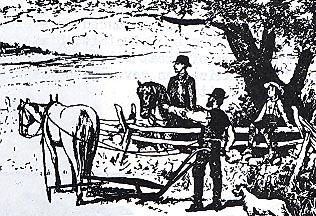 up their camps
along the Macon River (Creek). At these times
when the ground was dry, and the meadows were
colorful with wild flowers, it was hard to
believe that during the spring most of the land
could be completely under water. A good example
of these drastic changes was visible to all of
us in this neighborhood just this past February
when it rained for two days and melted all the
snow. The ditches and creeks couldn't carry the
water away fast enough, most of them were jammed
with ice and snow, and a good share of the
countryside looked like a lake for several days.
A week later, after the water had drained away,
it was hard to believe it ever happened. up their camps
along the Macon River (Creek). At these times
when the ground was dry, and the meadows were
colorful with wild flowers, it was hard to
believe that during the spring most of the land
could be completely under water. A good example
of these drastic changes was visible to all of
us in this neighborhood just this past February
when it rained for two days and melted all the
snow. The ditches and creeks couldn't carry the
water away fast enough, most of them were jammed
with ice and snow, and a good share of the
countryside looked like a lake for several days.
A week later, after the water had drained away,
it was hard to believe it ever happened.
When James Getty and his
family arrived, the wilderness northeast of
Britton was already dotted with crude farm
homes, many of the residents being Irish. Some
land had been cleared, and ditches were being
dug to drain the swamp. It was apparent to these
courageous and industrious pioneers that once
the land was drained, it would prove to be very
fertile and productive.
Southeast of Britton,
stretching to Deerfield, much of the land was
covered with tall grass, rather than forest, and
was for many decades called the "Prairie". From
"Ben's Comers" (Holloway Road and N. Blissfield
Hwy.) south past the German Lutheran Church,
taking in all that area called "Dutch Town", it
was also swamp and since it was drained in the
middle 1800's, and since then tiled, it has been
known as some of the best farm land in Michigan.
 Farming was back breaking
work done by hand with crude tools. Some were
fortunate enough to have a walking plow pulled
by a team of horses. The fanner walked behind
the plow, grasping the handles to keep it
upright. Mud boats (fiat beds with large runners
underneath) were used to haul stones out of the
fields, firewood up to the house, etc. The main
type of transportation was walking, horseback,
or horse drawn wagon. It wasn't until a few
years later that the buggy and the sleigh came
into common use. Farming was back breaking
work done by hand with crude tools. Some were
fortunate enough to have a walking plow pulled
by a team of horses. The fanner walked behind
the plow, grasping the handles to keep it
upright. Mud boats (fiat beds with large runners
underneath) were used to haul stones out of the
fields, firewood up to the house, etc. The main
type of transportation was walking, horseback,
or horse drawn wagon. It wasn't until a few
years later that the buggy and the sleigh came
into common use.
Logging was big business
here, too, but didn't compare with Northern
Michigan in the days of the lumber barons in
the 1870's and 1880's. In order to farm, the
land had to be cleared of the
 huge virgin
timber. Many of these logs were used to build
their log houses. Later on, sawmills were
scattered throughout the area, and the felled
trees provided the rafters, beams, joists and
studs; even the roof boards, sheathing, siding
and shingles for houses, barns, and other
buildings, as well as providing firewood for
fuel. huge virgin
timber. Many of these logs were used to build
their log houses. Later on, sawmills were
scattered throughout the area, and the felled
trees provided the rafters, beams, joists and
studs; even the roof boards, sheathing, siding
and shingles for houses, barns, and other
buildings, as well as providing firewood for
fuel.
It was a rugged way of
life, a constant struggle, but people were free.
On February 16, 1858,
James declared his intention to become a citizen
of the United States, and he renounced forever
all allegiance and fidelity to each and every
foreign Prince, Potentate, State, or Sovereignty
whatever, and particularly the Queen of Great
Britain, of whom he was a subject.
James' naturalization
covered the family, too, automatically making
his wife and children citizens.
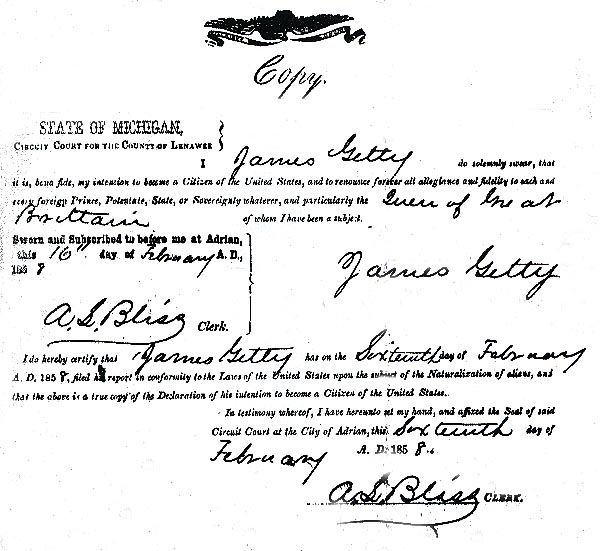
|